最新人教版九年级英语irregular verbs完整版
irregular verbs(人教版初中全部)
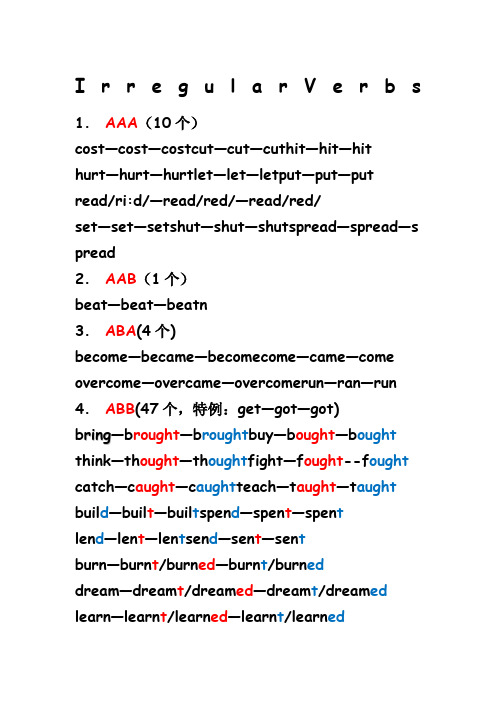
I r r e g u l a r V e r b s1.AAA(10个)cost—cost—costcut—cut—cuthit—hit—hit hurt—hurt—hurtlet—let—letput—put—putread/ri:d/—read/red/—read/red/ set—set—setshut—shut—shutspread—spread—s pread2.AAB(1个)beat—beat—beatn3.ABA(4个) become—became—becomecome—came—come overcome—overcame—overcomerun—ran—run4.ABB(47个,特例:get—got—got)b r i n g—b rought—b rought buy—b ought—b ought think—th ought—th ought fight—f ought--f ought catch—c aught—c aught teach—t aught—t aught buil d—buil t—buil t spen d—spen t—spen tlen d—len t—len t sen d—sen t—sen tburn—burn t/burn ed—burn t/burn ed dream—dream t/dream ed—dream t/dream ed learn—learn t/learn ed—learn t/learn edlight—lit/light ed—lit/light edsmell—sme lt/smell ed—sme lt/smell ed speed—sp ed/speed ed—sp ed/speed ed spell—spe lt/spell ed—spe lt/spell ed dig—dug—dughang—hung—hungwin—won—won feed—fed—fedlay—laid—laidlead—led—led mean—meant—meantmeet—met—met sit—sat–satmake—made—madepay—paid—paids ay—said—saidsell—sold—soldtell—told--told shine—shone—shonestick—stuck—stuckst an d—st oo d—st oo dunderstand—underst oo d—un derst oo d oversleep—overslept—oversleptsleep—slept—sle pthave/has—had—hadleave—left—left find—found—foundheard—heard—heard hold—held—heldget—got—got lose—lost—lostdeal—dealt—dealt feel—felt—feltkeep—kept—kept5.ABC(37个)am/is—was—beenare—were—beenbear—bore—b ornwear—wore—wornbegin—began—begunswim—swam—swum sing—sang—sungring—rang—rungdrink—drank--drunk blow—blew—blownbreak—broke—broken choose—chose—chosendo/does—did—done draw—drew—drawndrive—drove—driven eat—ate—eatenfall—fell—fallenfly—flew—flown forget—forgot—forgotten get—got—gottengive—gave—givengo—went—gon esee—saw--seen grow—grew—grownhide—hid—hiddenknow—knew —knownlie—lay—lainride—rode—riddenrise—ros e--risen mistake—mistook—mistakentake—took—taken shake—shook—shakenshow—showed—shownsteal —stole—stolenthrow—threw—thrown wake—woke—wokenwrite—wrote—written speak—spoke--spoken。
人教版英语九年级Unit 6 第3课时(A Grammar Focus-4c)

brought built
bought caught chosen
cost cut
动词原形 do
draw dream drink drive
eat fall
过去分词 done drawn
dreamt/dreamed
drunk driven eaten fallen
动词原形 find forget give go grow have hear
过去分词 found
forgotten
given gone grown had heard
动词原形 hide hurt keep know leave light make
过去分词 hidden hurt kept known left
lit/lighted made
动词原形 pay put read say see send set
Unit 6 When was it invented?
Section A Grammar Focus-4c
Learning objects
By the end of the class, you will be able to …
1. Grasp the sentence structures of the passive voice of the past tense and use it freely.
When was the zipper invented?
It was invented in 1893.
Who was it invented by?
It was invented by Whitcomb Judson.
WWhhaetndwifafserteeancberocuagnhyt otou sKeeorbeeat?ween the sentence
2024年人教版九年级上册英语第四单元课后练习题(含答案和概念)

2024年人教版九年级上册英语第四单元课后练习题(含答案和概念)试题部分一、选择题:A. attractB. interestC. involveD. encourageA. attractedB. interestedC. involvedD. encouraged3. Which of the following sentences uses the word "encourage" correctly?A. The teacher encouraged me to finish my homework.B. The teacher encouraged me to go to bed.C. The teacher encouraged me to eat more.D. The teacher encouraged me to watch TV.4. What is the past tense of "attract"?A. attractedB. attractC. attractsD. will attract5. Choose the best translation for "interest" in Chinese.A. 兴趣B. 重要性C. 关系D. 义务6. Which sentence is a correct question using "How"?A. How you like the movie?B. How do you like the movie?C. How you did like the movie?D. How did you like the movie?7. What is the correct form of "There be" sentence?A. There is a book on the table.B. There have a book on the table.C. There has a book on the table.D. There had a book on the table.8. Which word can be used to describe someone who is very interested in sports?A. enthusiasticB. boredC. lazyD. tiredA. interestedB. interestingC. interestD. interests10. Which of the following sentences is NOT a suggestion?A. Let's go to the park this weekend.B. I suggest we go to the park this weekend.C. Why don't we go to the park this weekend?D. I think you should go to the park this weekend.二、判断题:1. The word "attract" and "interest" have the same meaning. ( )2. "Encourage" means to give someone support and confidence. ( )3. The past tense of "encourage" is "encouraged". ( )4. "There is" and "There are" can be used interchangeably. ( )5. "Enthusiastic" is a negative adjective. ( )6. A question using "How" always starts with "How do". ( )7. "There have" is a correct form of "There be" sentence. ( )8. The word "bored" can be used to describe someone who is very interested in something. ( )9. "Interesting" and "interested" can be used interchangeably. ( )10. A suggestion always starts with "I suggest". ( )三、填空题:1. The opposite of "bored" is ________.2. If someone is very interested in a subject, we can say they are ________ about it.3. To ask for permission, we can say "Can I ________ your book?"4. "There ________ a lot of books on the shelf" is a correct sentence.5. The teacher ________ us to participate in the school's sports day.6. If you want to suggest something, you can say "Whydon't we ________?"7. The correct form of "There is" in plural is "There________."8. "I am ________ in learning new languages" is a correct sentence.9. The past tense of "suggest" is ________.10. To make a polite request, we can say "Could youplease ________ me?"12. If something is very attractive, it has a strongpower of ________.13. "She ________ her audience with her speech" means she made them interested.14. To express interest in someone's hob, you can say"I'm ________ in your hob."15. "There ________ many students in the classroom" is a correct sentence.16. The correct form of "There is" for uncountable nounsis "There ________."17. "I ________ you to read this book" means I advise you to read it.18. To describe someone who is not interested in anything, we can use the word ________.19. "The ________ of the movie was so strong thateveryone wanted to watch it."四、简答题:1. Explain the difference between "interested" and "interesting."2. How do you form a question using "How"?3. What is the correct structure of a "There be" sentence?4. Give an example of how to use "encourage" in a sentence.5. What is the past tense of "attract"?6. How do you make a suggestion in English?7. What is the opposite of "encourage"?8. Write a sentence using "There are" with a plural noun.9. Explain how to use "suggest" in a sentence.10. How do you express lack of interest in something in English?一、选择题答案:1. A. attract2. A. attracted3. A. The teacher encouraged me to finish my homework.4. A. attracted5. A. 兴趣6. B. How do you like the movie?7. A. There is a book on the table.8. A. enthusiastic9. A. interested10. B. I suggest we go to the park this weekend.二、判断题答案:1. ×2. √3. √4. ×5. ×6. ×7. ×8. ×9. ×10. ×三、填空题答案:1. interested2. enthusiastic3. borrow4. is5. encouraged6. go7. are8. interested9. suggested10. help11. heart12. attraction13. attracted14. interested15. are16. is17. suggest18. bored19. attraction20. Would四、简答题答案:1. "Interested" is used to describe someone who has a feeling of interest in something, while "interesting" is used to describe something that is likely to interest someone.2. You form a question using "How" starting with "How" followed the subject and verb, for example: "How do you like it?"3. The correct structure of a "There be" sentence is "There" + verb (is/are) + subject + additional information.4. Example: The teacher encouraged us to participate in the school's sports day.5. The past tense of "attract" is "attracted."6. To make a suggestion in English, you can use phrases like "Why don't we," "Let's," or "I suggest that we"7. The opposite of "encourage" is "discourage."8. Example: There are many books on the shelf.9. Example: I suggest we start the meeting on time.10. To express lack of interest, you can say "I'm not interested in" or "I don't have much interest in"Vocabulary: The test covers understanding and using vocabulary related to interest, attraction, and encouragement.Grammar: Questions test knowledge of verb tenses (past tense), sentence structure (There be sentences), and question formation (How questions).Adjectives: The test assesses the use of adjectives like "interested," "interesting," "enthusiastic," and "bored."各题型知识点详解和示例:选择题: Tests the ability to choose the correct word or phrase based on context. It also checks the understanding of vocabulary and grammar rules.Example: "The teacher encouraged me to finish my homework" tests the correct use of the verb "encourage."判断题: Assesses the understanding of grammatical rules and vocabulary usage.Example: "The past tense of 'encourage' is'encouraged'" tests the knowledge of verb conjugation.填空题: Evaluates the ability to use vocabulary and grammar correctly in sentences.Example: "The opposite of 'bored' is ________" teststhe knowledge of antonyms.简答题: Tests the ability to explain grammatical concepts and use them in sentences.Example: Explaining the difference between "interested" and "interesting" requires an understanding of adjectives and their usage.试题部分一、选择题:1. In Unit 4, which word is used to describe a person who is good at cooking?A. ChefB. ArtistC. ScientistD. Athlete2. Which of the following sentences uses the simplefuture tense correctly?A. I will go to the movies last night.B. She will visit her grandparents next week.C. They will goes to the park tomorrow.D. He will eating breakfast in the morning.3. What is the correct form of the word "invite" in the past tense?A. InvitedB. InvitedC. InviteD. InvitingA. WhereB. WhenC. WhyD. How5. Which of the following phrases means "a long time ago"?A. A few days agoB. A week agoC. A month agoD. A long time ago6. In English, which word is used to connect two independent clauses?A. BecauseB. AndC. ButD. Or7. What is the correct form of the word "happy" when describing multiple people?A. HappyB. HappiesC. HappiesD. Happiness8. Which of the following sentences is in the passive voice?A. The teacher taught the students.B. The students were taught the teacher.C. The teacher teaches the students.D. The students teach the teacher.A. DoB. DoesC. DoingD. DidA. UnB. lyC. ReD. ness二、判断题:1. The past tense of "do" is "did". ( )2. "A lot of" and "lots of" can be used interchangeably. ( )3. The simple present tense is used to describe actions that happen regularly. ( )4. "Whose" is a possessive pronoun. ( )6. "They" is a singular pronoun. ( )7. The past participle of "go" is "went". ( )9. "He" and "she" are subjective pronouns. ( )10. "There" and "their" have the same meaning. ( )三、填空题:1. The past tense of "eat" is ________.2. "I am" is the first person singular of the ________ tense.3. The opposite of "expensive" is ________.4. A noun is a word that represents a ________, ________, or ________.5. The plural form of "child" is ________.6. The correct form of "I" in the possessive case is________.7. "She ________ to the store yesterday" is an example of the simple past tense.8. The contraction for "they are" is ________.10. The prefix "un" means ________.11. "Read" and "write" are examples of ________ verbs.12. "I have two ________ and three ________" shows the use of plural nouns.13. The word "________" is used to connect two independent clauses.14. "________" is the question word used to ask for the reason.15. "________" is the past participle form of "do".16. "I am ________ to see you" is a positive sentence using an adjective.17. The opposite of "hot" is ________.18. "________" is the correct form of "be" in the present tense for "he".19. "I ________ a book" is the correct form to express possession.20. "________" is the correct form of "we" in the objective case.四、简答题:1. What is the difference between "its" and "it's"?2. Explain the difference between a regular and an irregular verb.5. What is a preposition and give three examples.6. Describe how to use the simple future tense correctly.7. What is the difference between "affect" and "effect"?8. How do you identify the subject and predicate in a sentence?9. What is an adverb and how does it differ from an adjective?10. Explain the concept of subjectverb agreement.一、选择题答案:1. A2. B3. A4. A5. D6. B7. C8. B9. A10. A二、判断题答案:1. √2. √3. √4. √5. √6. ×7. ×8. √9. √10. ×三、填空题答案:1. ate2. present3. cheap4. person, place, thing5. children6. mine7. went8. they're9. go10. not11. transitive12. cats, dogs13. and14. why15. done16. happy17. cold18. is19. have20. us四、简答题答案:1. "Its" is a possessive pronoun showing ownership, while "it's" is a contraction of "it is" or "it has".2. Regular verbs form their past tense and pastparticiple adding ed to the base form, while irregular verbs change their form in various ways.3. Commas are used to separate elements in a list, to set off nonrestrictive clauses, and to separate coordinate adjectives.4. Comparative is formed adding er or using "more" before the adjective, and superlative is formed adding est or using "most" before the adjective.5. A preposition shows the relationship between a noun or pronoun and other words in the sentence. Examples: in, on, under.6. The simple future tense is formed with will/shall + base verb and is used to talk about future actions or intentions.8. The subject is the person or thing that performs the action, and the predicate is the part of the sentence that tells what the subject does or is.9. An adverb modifies a verb, adjective, or other adverb and often ends in ly. It differs from an adjective, which modifies a noun.10. Subjectverb agreement means that the subject and verb must agree in number and person.Vocabulary: Nouns (plural forms), verbs (regular and irregular), adjectives (opposites), and prefixes.Syntax: Sentence structure (subject, predicate), clause types (independent, dependent), and question formation.各题型知识点详解和示例:选择题: Assess understanding of vocabulary, grammar rules, and sentence structure. Example: Identifying the correct tense usage.判断题: Evaluate knowledge of grammar rules and vocabulary usage. Example: Recognizing possessive pronouns.填空题: Test ability to apply grammar rules and vocabulary knowledge. Example: Filling in the correct past tense form of a verb.简答题: Measure the ability to explain and understand grammatical concepts. Example: Explaining the difference between adjectives and adverbs.。
人教版初中英语动词不规则变化表(完整版)
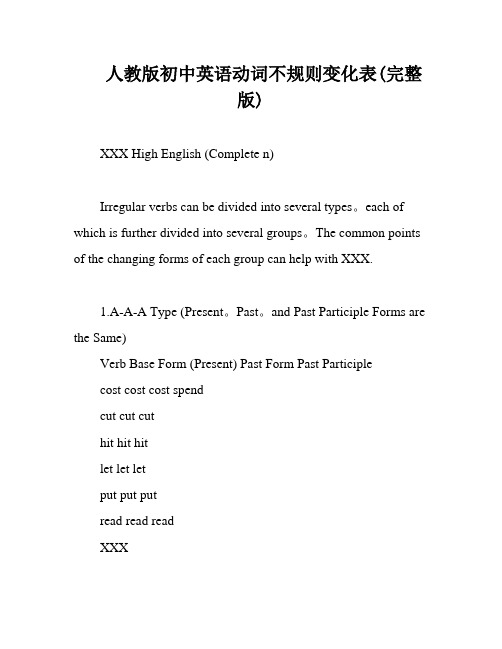
人教版初中英语动词不规则变化表(完整版)XXX High English (Complete n)Irregular verbs can be divided into several types。
each of which is further divided into several groups。
The common points of the changing forms of each group can help with XXX.1.A-A-A Type (Present。
Past。
and Past Participle Forms are the Same)Verb Base Form (Present) Past Form Past Participlecost cost cost spendcut cut cuthit hit hitlet let letput put putread read readXXX2.A-A-B Type (Present and Past Forms are the Same)Verb Base Form (Present) Past Form Past ParticipleXXX3.A-B-A Type (Present and Past Participle Forms are the Same)Verb Base Form (Present) Past Form Past Participlecome came comeXXXrun ran run4.A-B-B Type1) XXX "d" or "t" after the base form of the verb to form the past XXX.Verb Base Form (Present) Past Form Past ParticipleXXXXXXXXXhear hear XXX2) Change the last XXX "d" of the base form of the verb to "t" to form the past tense or past participle.Verb Base Form (Present) Past Form Past Participlebuild built builtXXXlose lost lostsend sent sentXXX3) OthersVerb Base Form (Present) Past Form Past Participlepay paid paidlay laid laidsay said saidXXXXXXXXXXXXkeep kept keptXXXXXXunderstand understood understoodXXXXXXXXXXXX XXXXXXXXXfind found foundget got got/gottenHang。
初中英语人教新目标九年级全一册一般过去时课件
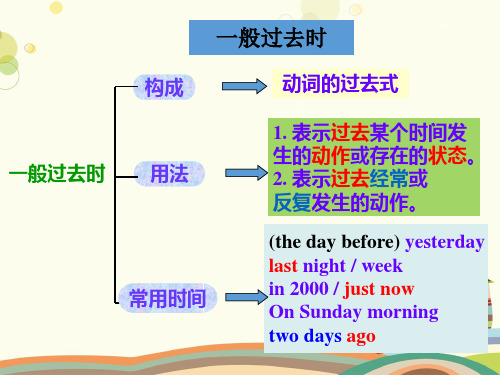
B. was; is
C. was; will be D. is; was
【答案】考查时态的用法。根据last year可 知第一空用过去时,根据now可知第二空 用一般现在时,故选B。
—Do you know who took the students to the old people’s home, Tony?
动词过去式 的构成
规则动词 regular verbs
不规则动词 irregular verbs
1. 动词be的变化:
am
is
was are were
2. 助动词do的变化: do→ did (在过去时里助动词do没有人称 和数的变化)
Did you play soccer yesterday?
Did he play soccer yesterday?
3. 实义动词的变化: 实义动词分规则变化和不规则变化 规则变化有以下几种: (1) 一般情况下在动词后加-ed。 play—played visit—visited walk—walked clean—cleaned
(2) 以不发音的e结尾的词,在词尾加-d。 e.g. note—noted like—liked dance—danced name—named
—Well, Mr. Smith _______.
A. took B. does C. did D. do 【答案】C 【解析】考查动词的时态。根据问句中的took可以判断为一般过去时,故回答 中用助动词did来替代。所以选择答案C。
— I called you yesterday evening, but you were not in.
—Sorry, I _____ in the shop with my mother.
人教版英语新目标九年级全一册书后不规则动词表

IrregularVerbsbe(am, is,are) was,were been bear bore born beat beat beaten become became become begin began begun blow blew blown break broke broken bring brought brought build built built burn burnt/ burned burnt/ burned buy bought bought catch caught caught choose chose chosen come came come cost cost cost cut cut cut deal dealt dealt dig dug dug do(does) did done draw drew drawn dream dreamt/ dreamed dreamt/ dreamed drink drank drunk drive drove driven eatateeatenfall fell fallen feed fed fed feel felt felt fight fought fought find found found fly flew flown forget forgot forgotten get got got/gotten give gave given go went gone grow grew grown hang hung hung have (has) had had hear heard heard hide hid hidden hit hit hit hold held held hurt hurt hurt keep kept kept know knew known lay laid laid lead ledledlearn learnt/learned learnt/ learned leave left leftlet let let lie lay lain light lit/lighted lit/lighted lose lost lost make made made mean meant meant meet met met mistake mistook mistaken overcome overcame overcome oversleep overslept overslept pay paid paid put put put read /ri:d/ read /red/ read /red/ ride rode ridden ring rang rung say said said see saw seen sell sold sold send sent sent set set set shake shook shaken shine shone shone show showed shown shutshutshutsing sang sung sit sat sat sleep slept slept smell smelt/ smelled smelt/ smelled speak spoke spoken speed sped/ speeded sped/ speededspellspelt/spelledspelt/spelledspend spent spent spread spread spreadstand stood stoodsteal stole stolenstick stuck stuckswim swam swumtake took takenteach taught taughttell told toldthink thought thought throw threw thrown understand understood understood wake woke wokenwear wore wornwin won wonwrite wrote written。
英语不规则动词表Irregular verbs(修正重排-带音标和汉语解释)
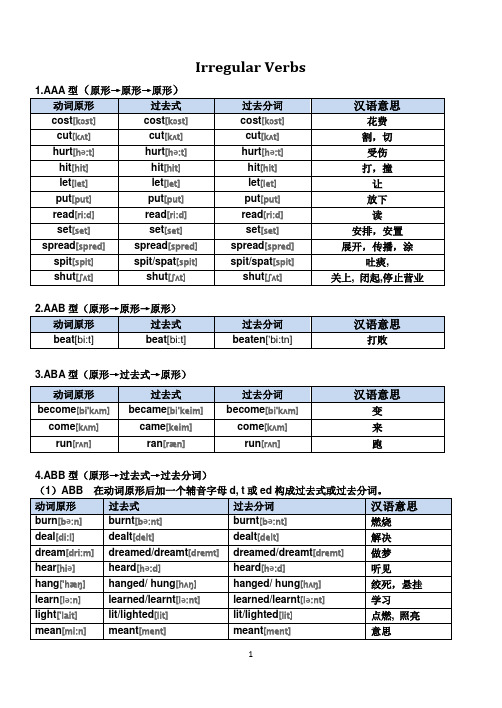
do[du:, du:]
did[did]
done[dʌn]
做
fly[flai]
flew[flu:]
flown[fləun]
飞
go[ɡəu]
went[went]
gone[ɡɔn]
去
lie[lai]
lay[lei]
lain[lein]
躺
wear[weə]
wore[wɔ:]
worn[wɔ:n]
穿
gave[ɡeiv]
given['ɡivən]
给
grow[ɡrəu]
grew[ɡru:]
grown[ɡrəun]
生长
forgive[fə'ɡiv]
forgave[fə'ɡeɪv]
forgiven[fə'givn]
原谅,饶恕
know[nəu]
knew[nju:, nu:]
known[nəʊn]
知道
mistake[mi'steik]
found[faʊnd]
found[faʊnd]
发现,找到
get[ɡet]
got[ɡɔt]
got/gotten['ɡɔtən]
得到
hold[həuld]
held[held]
held[held]
拥有,握住,支持
lead[li:d]
led[led]
led[led]
引导,带领,领导
meet[mi:t]
met[met]
忘记
freeze[fri:z]
froze[frəuz]
frozen['frəuzn]
冷冻,结冰,感到严寒
初中英语不规则动词表(含音标和中文意思)
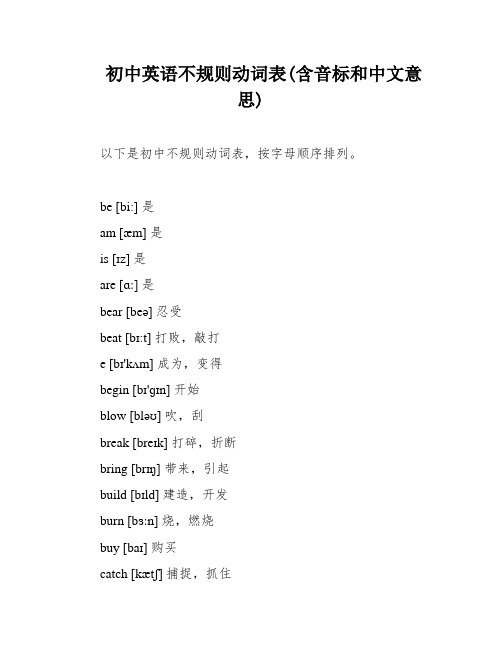
初中英语不规则动词表(含音标和中文意思)以下是初中不规则动词表,按字母顺序排列。
be [bi:] 是am [æm] 是is [ɪz] 是are [ɑː] 是bear [beə] 忍受beat [bɪ:t] 打败,敲打e [bɪ'kʌm] 成为,变得begin [bɪ'ɡɪn] 开始blow [bləʊ] 吹,刮break [breɪk] 打碎,折断bring [brɪŋ] 带来,引起build [bɪld] 建造,开发burn [bɜːn] 烧,燃烧buy [baɪ] 购买catch [kætʃ] 捕捉,抓住choose [tʃuːz] 选择come [kʌm] 来cost [kɔst] 花费cut [kʌt] 切,割XXX [XXXɡ] 挖掘do [du:] 做draw [drɔː] 画,拉dream [drɪ:m] 梦见drink [drɪŋk] 喝drive [draɪv] 驾驶这是初中不规则动词表,按字母顺序排列。
每个动词都有原形、过去式和过去分词形式。
请注意,有些动词的过去式和过去分词形式是相同的。
以下是格式正确、已删除明显有问题段落并稍作改写的文章:初中不规则动词表不规则动词是英语中最常见的词汇之一。
它们的过去式和过去分词形式不遵循规则,需要单独记忆。
以下是一些常用的不规则动词及其过去式和过去分词形式。
吃,喝(汤)eat - ate - XXX落下,倒下fall - fell - fallen喂养feed - fed - fed感觉,摸起来feel - felt - felt打架,奋斗fight - fought - fought发现,找到find - found - found飞,飞翔fly - flew - flown忘记,遗忘et - ot - otten得到,达到get - got - got给,赠予give - gave - given去go - went - gone生长,渐变grow - grew - grown悬挂hang - hung - hung有,享有have/had - had - had听见,得知hear - heard - heard躲藏,隐藏hide - hid - hidden打hit - hit - hit保持,保留hold - held - held受伤hurt - hurt - hurt保持,保留keep - kept - XXX知道,了解know - knew - known放置lay - laid - laid带领;过…(的生活);导致lead - led - led研究,学会learn - XXX以上是一些常用的不规则动词,掌握它们的过去式和过去分词形式对于研究英语非常重要。
Irregular Verbs(九年级全)

wake woke
wear
wore
win
won
write
wrote
spent spread stood stolen stuck swum taken taught told thought thrown understood woken worn won
written
2
send
sent
set
set
shake shook
shine shone
show showed
shut
shut
lost made meant met mistaken overcome overslept paid put read/ red/ ridden rung risen run said seen sold sent set shaken shone shown shut
Verb
fall feed feel fight find fly forget get give go grow hang (悬挂)
Past tense fell fed felt fought found flew forgot got gave went grew
hung
Past participle fallen fed felt fought found flown forgotten got/gotten given gone grown
bought caught chosen come cost cut dealt dug
do (does) did
done
draw drew
drawn
dream dreamt/dreamed dreamt/dreamed
(完整)人教版九年级英语irregularverbs完整版.docx
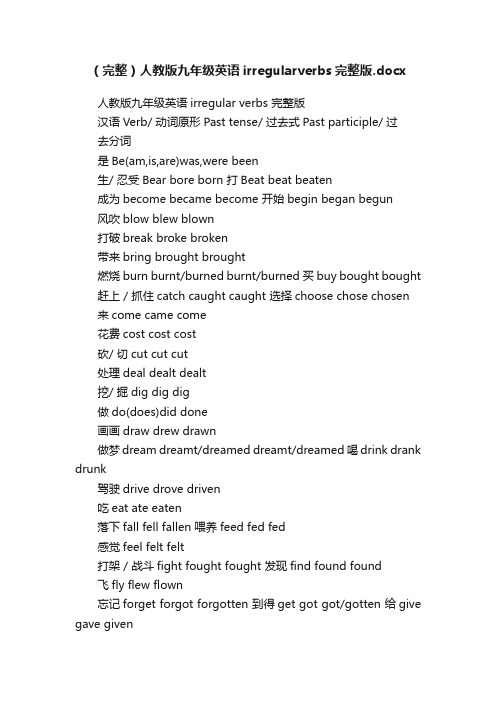
(完整)人教版九年级英语irregularverbs完整版.docx人教版九年级英语irregular verbs 完整版汉语Verb/ 动词原形Past tense/ 过去式Past participle/ 过去分词是Be(am,is,are)was,were been生/ 忍受Bear bore born 打Beat beat beaten成为become became become 开始begin began begun风吹blow blew blown打破break broke broken带来bring brought brought燃烧burn burnt/burned burnt/burned 买buy bought bought 赶上 / 抓住catch caught caught 选择choose chose chosen 来come came come花费cost cost cost砍/ 切cut cut cut处理deal dealt dealt挖/ 掘dig dig dig做do(does)did done画画draw drew drawn做梦dream dreamt/dreamed dreamt/dreamed 喝drink drank drunk驾驶drive drove driven吃eat ate eaten落下fall fell fallen 喂养feed fed fed感觉feel felt felt打架 / 战斗fight fought fought 发现find found found飞fly flew flown忘记forget forgot forgotten 到得get got got/gotten 给give gave given去go(goes)went gone生长grow grew grown悬挂hang hung hung有have(has)had had听到hear heard heard躲藏hide hid hidden 打击hit hit hit持有hold held held使受伤hurt hurt hurt保持keep kept kept知道know knew known 放置lay laid laid导致lead led led学习learn Learnt/learned Learnt/learned 离开 / 留下leave left left 把...借给lend lent lent 让let let let躺lie lay lain点燃 / 照亮light Lit/lighted Lit/lighted 丢失lose lost lost 制造make made made 意味mean meant meant 满足 / 遇见meet met met 弄错mistake mistook mistaken 克服overcome overcame overcome 睡过头oversleep overslept overslept 支付pay paid paid 放put put put读read/ri:d/read/red/read/red/骑/ 乘坐ride rode ridden 按铃ring rang rung 上升rise rose risen 跑run ran run说say said said 看见see saw seen 送send sent sent卖sell sold sold 树立set set set 摇动shake shook shaken 照耀shine shone shone 显示show showed shown 关闭shut shut shut 唱歌sing sang sung坐sit sat sat睡觉sleep slept slept嗅/ 闻smell smelt/smelled smelt/smelled 说话speak spoke spoken 加速speed sped/speeded sped/speeded 拼写spell spelt/spelled spelt/spelled 花费spend spent spent 传播spreadspread spreaad 站立stand stood stood偷steal stole stolen坚持 / 粘贴stick stunk stunk 游泳swim swam swum拿/ 取take took taken 教导teach taught taught 告诉tell told told想think thought thought抛/ 投throw threw thrown 理解understand understood understood 醒来wake woke woken穿wear wore worn赢得win won won写write wrote written。
- 1、下载文档前请自行甄别文档内容的完整性,平台不提供额外的编辑、内容补充、找答案等附加服务。
- 2、"仅部分预览"的文档,不可在线预览部分如存在完整性等问题,可反馈申请退款(可完整预览的文档不适用该条件!)。
- 3、如文档侵犯您的权益,请联系客服反馈,我们会尽快为您处理(人工客服工作时间:9:00-18:30)。
汉语
Verb/动词原形
Past tense/过去式
Past participle/过去分词
是
Be(am,is,are)
was,were
been
生/忍受
Bear
bore
born
打
Beat
beat
beaten
成为
become
became
become
开始
slept
嗅/闻
smell
smelt/smelled
smelt/smelled
说话
speak
spoke
spoken
加速
speed
sped/speeded
sped/speeded
拼写
spell
spelt/spelled
spelt/spelled
花费
spend
spent
spent
传播
spread
spread
spreaad
站立
stand
stood
stood
偷
steal
stole
stolen
坚持/粘贴
stick
stunk
stunk
游泳
swim
swam
swum
拿/取
take
took
taken
教导
teach
taught
taught
告诉
tell
told
told
想
think
thought
thought
抛/投
throw
躺
lie
lay
lain
点燃/照亮
light
Lit/lighted
Lit/lighted
丢失
lose
lost
lost
制造
make
made
made
意味
mean
meant
meant
满足/遇见
meet
met
met
弄错
mistake
mistook
mistaken
克服
overcome
overcame
overcome
begin
began
begun
风吹
blow
blew
blown
打破
break
broke
broken
带来
bring
brought
brought
燃烧
burn
burnt/burned
burnt/burned
买
buy
bought
bought
赶上/抓住
catch
caught
caught
选择
choose
chose
threw
thrown
理解
understand
understood
understood
醒来
wake
woke
woken
穿
ቤተ መጻሕፍቲ ባይዱwear
wore
worn
赢得
win
won
won
写
write
wrote
written
使受伤
hurt
hurt
hurt
保持
keep
kept
kept
知道
know
knew
known
放置
lay
laid
laid
导致
lead
led
led
学习
learn
Learnt/learned
Learnt/learned
离开/留下
leave
left
left
把...借给
lend
lent
lent
让
let
let
let
到得
get
got
got/gotten
给
give
gave
given
去
go(goes)
went
gone
生长
grow
grew
grown
悬挂
hang
hung
hung
有
have(has)
had
had
听到
hear
heard
heard
躲藏
hide
hid
hidden
打击
hit
hit
hit
持有
hold
held
held
睡过头
oversleep
overslept
overslept
支付
pay
paid
paid
放
put
put
put
读
read/ri:d/
read/red/
read/red/
骑/乘坐
ride
rode
ridden
按铃
ring
rang
rung
上升
rise
rose
risen
跑
run
ran
run
说
say
said
said
chosen
来
come
came
come
花费
cost
cost
cost
砍/切
cut
cut
cut
处理
deal
dealt
dealt
挖/掘
dig
dig
dig
做
do(does)
did
done
画画
draw
drew
drawn
做梦
dream
dreamt/dreamed
dreamt/dreamed
喝
drink
drank
drunk
驾驶
drive
drove
driven
吃
eat
ate
eaten
落下
fall
fell
fallen
喂养
feed
fed
fed
感觉
feel
felt
felt
打架/战斗
fight
fought
fought
发现
find
found
found
飞
fly
flew
flown
忘记
forget
forgot
forgotten
看见
see
saw
seen
送
send
sent
sent
卖
sell
sold
sold
树立
set
set
set
摇动
shake
shook
shaken
照耀
shine
shone
shone
显示
show
showed
shown
关闭
shut
shut
shut
唱歌
sing
sang
sung
坐
sit
sat
sat
睡觉
sleep
slept
